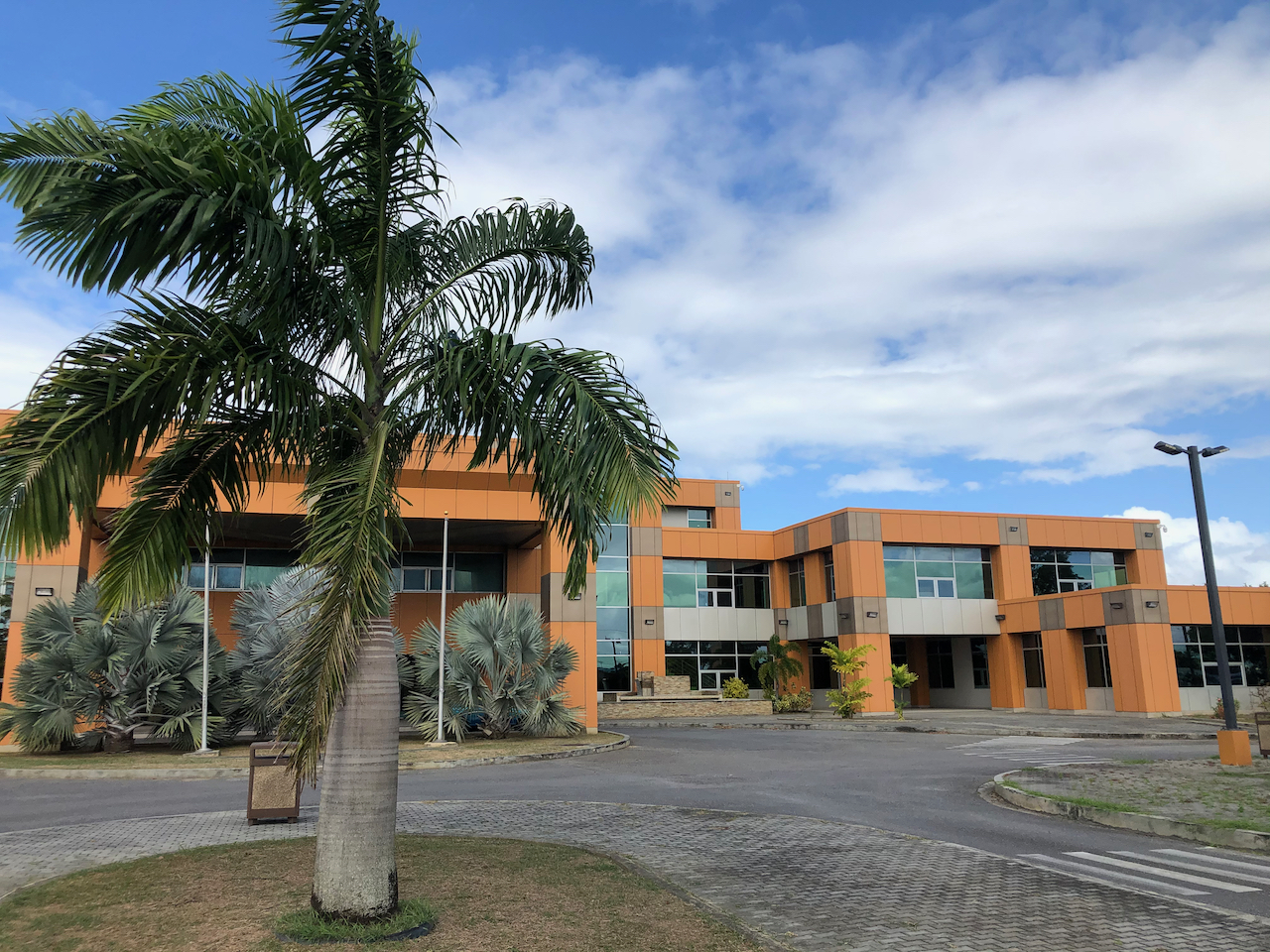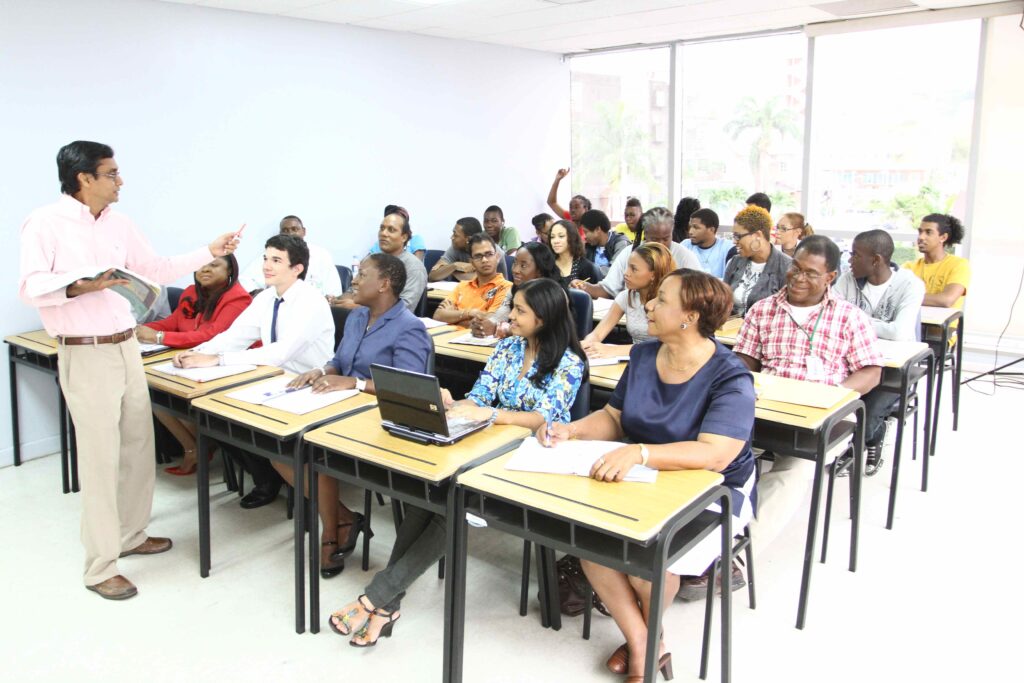About COSTAATT
Overview
Accredited Excellence: COSTAATT Leads in Quality Education and Innovation.
The College of Science, Technology and Applied Arts of Trinidad and Tobago (COSTAATT) is a premier public tertiary institution, established on October 27, 2000, by an Act of Parliament (Act No. 77 of 2000). As one of the largest tertiary institutions in Trinidad and Tobago, COSTAATT offers a diverse range of academic programmes, including certificates, diplomas, associate degrees, and bachelor’s degrees, in critical areas such as health sciences, business, information technology, environmental studies, and applied arts. The College is dedicated to providing accessible, high-quality education that aligns with the needs of the nation’s workforce and contributes to national and regional development.

History of COSTAATT
COSTAATT was established as a multi-campus community college through the amalgamation of seven tertiary institutions:
- John S. Donaldson Technical Institute
- San Fernando Technical Institute
- Government Vocational Centre (Point Fortin)
- Eastern Caribbean Institute of Agriculture and Forestry (ECIAF)
- Joint Services Staff College
- Metal Industries Company Limited (MIC)
- NIHERST Colleges (including the College of Nursing, College of Health Sciences, School of Languages, Business Management Division, and General Education Division)
From 1998 to 2000, the Community College Implementation Team (CCIT) worked to harmonize the academic programmes, resources, and systems of these institutions, laying the foundation for COSTAATT’s establishment. The College’s enabling legislation set out the following core objectives:
- To contribute to national and regional development by providing broad-based access to innovative and socially responsive education.
- To offer programmes that meet internationally acceptable standards, preparing students for careers and advanced studies.
- To promote a culture of excellence through innovation, diversity, and self-evaluation.
- To foster cross-cultural understanding and mutual respect.
- To become a center of excellence for scholarly work and applied research.
Pioneering Excellence in Science, Technology, and Applied Arts Since 2000.
Empowering Students for Careers, Advanced Studies, and Lifelong Learning.
Who We Are
COSTAATT is a transformative force in Trinidad and Tobago’s education system, offering programmes that prepare students for careers, advanced studies, and lifelong learning. The College plays a strategic role in national development by:
- Providing career education for paraprofessional, technologist, and mid-managerial roles.
- Offering transfer education for students pursuing further studies at universities.
- Delivering developmental education to support academically underprepared students through programmes like College Prep and COMPASS.
- Providing continuing and community education to meet the needs of diverse populations, including working professionals and lifelong learners.
COSTAATT is also the official translation body for the Government of Trinidad and Tobago, further underscoring its importance in national development
Institutional Profile
Mission
To be the premier educational institution providing high-quality, affordable, and accessible programmes that meet the needs of business, industry, and the community, while fostering the personal and professional development of students, faculty, and staff.
Vision
To be a student-centered, innovative, and world-class multi-campus college that promotes excellence in teaching and learning, serves diverse communities, and produces lifelong learners who can compete globally.

A Transformative Mission
COSTAATT’s primary mandate is to deliver:
Career Education:
Preparing students for employment at the paraprofessional, technologist, and mid-managerial levels in various disciplines.
Transfer Education:
Preparing students for future enrollment in undergraduate programmes.
Developmental Education:
Providing remedial education courses for academically underprepared students.
Continuing and Community Education:
Offering short-term programmes that meet the needs of the community.
Milestones and Achievements
1998–2002
During the early years of the College’s history (1998-2002), there was an emphasis on aligning all of the programme offerings to the North American credit-based system to facilitate horizontal transfer among the institutions. In addition, the College worked towards introducing the associate degree with its distinctive general education component to enhance the quality of the existing technical diplomas. This period also saw the introduction of the College Prep programme which catered to students who needed additional support to strengthen their academic foundations in English and Mathematics, in order to pursue tertiary level studies.
When COSTAATT was formally established in 2000, its programmes reflected the full spectrum of a comprehensive community college, including engineering, agriculture, nursing and allied health sciences, business and information technologies, foreign languages, environmental studies, criminal justice, social and behavioural sciences, and the performing arts. Through the College Prep programme, the College had also established a mechanism for the seamless movement from vocational training in the trades to technical/technologist/para-professional training at the associate degree level. This mechanism was critical to empowering the national education system to deliver on one of its primary functions: to facilitate socio-economic mobility for its citizens, a key recommendation of the Ministry of Education’s White Paper (1993-2003).
Although the College had been legally established as a body corporate in October 2000, no Board of Trustees was appointed to govern the College until September 2002. From 2000-2002 therefore, the nascent community college sought to maintain its momentum in an environment of uncertainty. The CCIT, continued its work in planning for the ongoing development of the College, as several studies conducted then reflected the need for the region to significantly expand its capacity to produce graduates at the technician/para-professional /technologist /mid-managerial level to drive economic diversification and development.
2002–2004
In the period following 2002 – early 2004, a new vision for the development of the tertiary education sector in Trinidad and Tobago resulted in the establishment of the University of Trinidad and Tobago (UTT). In support of this initiative, the John S. Donaldson Technical Institute, the San Fernando Technical Institute and the Eastern Caribbean Institute of Agriculture and Forestry (ECIAF) were transferred from COSTAATT to the UTT. The Metal Industries Company Limited (MIC) was not absorbed by either COSTAATT or UTT and therefore operated independently, and the Government Vocational Centre (GVC) was placed under the jurisdiction of MIC.
COSTAATT was left with a reduced range of programme offerings, drawn from the six NIHERST teaching colleges (Information Technology College, College of Nursing, College of Health Sciences, School of Languages, Business Management and General Education Divisions) and the Joint Services Staff College.
2004–2008
During the mid-2000s two other major reforms came into effect. The first was the implementation of the Government Assistance for Tuition Expenses (GATE) programme, a student tuition fee grant, which was intended to remove the financial barriers to accessing post-secondary and university education in Trinidad and Tobago. The second was the establishment of the Accreditation Council of Trinidad and Tobago (ACTT) as the principal authority with responsibility for regulating the operations of all post-secondary and tertiary education institutions operating in Trinidad and Tobago. The National Training Agency (NTA) which was established in 1999 retained responsibility for quality assurance of the technical-vocational education and training (TVET) institutions. Arguably, by 2005, the national tertiary education system had become more diverse as a result of these developments, but the goals of efficiency, relevance and seamlessness were still to be attained.
Despite these institutional and sectoral changes, COSTAATT never lost sight of the critical importance of its role as the national community college and forged ahead with its developmental plans, all the more so, because with the absorption of the technical institutes into UTT, the College had lost most of its physical plant and was constrained to manage its growth and development in leased facilities constructed for commercial and not educational purposes.
2008–2012
During the 2008 to 2012 period, fueled by the ready availability of GATE funding, the College experienced rapid growth – moving from programme offerings of five bachelor’s degrees and thirteen associate degrees to forty-two bachelor’s degrees and thirty-one associate degrees by 2012. The student population doubled from 5,039 in September 2008 to 11,631 in September 2011. In addition, in 2009, the College introduced its signature Compensatory Programmes and Academic Support Services (COMPASS) programme which, building on the original College Prep courses, offered a wider range of developmental education courses and student support services, to meet the needs of academically underprepared students who nevertheless demonstrated both the desire and the capacity, to successfully pursue tertiary level studies.
Another notable achievement of the College during this period was its attainment of institutional accreditation status from the ACTT in October 2010 – making it the first institution in the country to achieve this status. This was followed in 2011 with recognition for the College’s Quality Management System (QMS) by ACTT at the inaugural Quality in Tertiary Education (QuiTE) Awards ceremony.
The rapid growth in student demand and enrolment outpaced the College’s physical and human resources and in 2012, the Board and management embarked on a period of review of COSTAATT’s programme offerings and academic policies with a view to strengthening its quality management capacity. Significantly, in 2011, Government approved funding for the construction of COSTAATT’s first ever purpose-built campus on a 30-acre parcel of state lands in Chaguanas.
2013–2018
Following an extensive quality review and stakeholder engagement exercise in 2013, management prioritised several initiatives to expedite students’ time-to-programme-completion, which had been negatively affected by limited classroom space and faculty resources to deliver the College’s mandatory core curriculum. As a result of these efforts, graduation rates increased and the College enrolment levelled out at 8,033 students across its multiple campuses in the Academic Year (AY) 2015-2016.
This period also saw a sustained focus on expanding and enhancing the teaching-learning environment at several of the COSTAATT campuses. In September 2013, the College formally opened its El Dorado Campus at the Academy of Nursing and Allied Health, based on extensive refurbishment works on the former El Dorado Youth Camp for Girls. The Sangre Grande Campus, which was completed in 2012 based on the refurbishment of a cinema, was also formally opened in 2013.
The College undertook to upgrade the North Learning Centre which had formally housed the NIHERST School of Languages since 1985 and repurposed the building to serve as the Ken Gordon School of Journalism and Communication Studies.
The College also undertook to refurbish another commercial facility to establish a dedicated space for student services for the City Campus, which remains the highest enrolling of the six campuses of the College, and the one least able to provide the requisite range of student support services because of space constraints.
The College also established a dental training facility in Diego Martin to support its dental therapy programme and formally launched its first purpose-built facility in Chaguanas, now the location of its main campus and central administrative offices, in addition to several classrooms and computer and science laboratories and a well-appointed auditorium.
The experience of striving to manage both programme quality and service standards for a burgeoning student population spread across multiple facilities, which were neither designed nor adequate for tertiary level studies resulted in the development of a new Master Plan 2016 – 2030 for COSTAATT, which will support the College’s aim to attain its full potential to be a transformative force in Trinidad and Tobago.
2018-2025
COSTAATT has embarked on a new era under the leadership of Dr. Keith Nurse. With a forward-thinking vision for a post-COVID-19 world and the evolving educational landscape, the College is committed to equipping the region with future-ready skills.
This commitment is reflected in several key initiatives:
- Refocused Schools: COSTAATT’s academic structure has been revitalized with a digital focus integrated into each school’s name and the addition of a new school, creating a comprehensive portfolio:
- Ken Gordon School of Communication, Creative and Digital Media
- School of Business and Digital Technologies
- School of Liberal Arts, Education and Digital Humanities
- School of Nursing, Health and Medical Technologies
- School of Environment, Circular Economy and Sustainability
- School of Workforce Enhancement and Development
To support entrepreneurs, COSTAATT launched an Upskilling Academy and Tech Hub. These resources cater to key sectors, including Creative Industries and New Media, Digital and Cyber Entrepreneurship, Tourism, Hospitality and Destination Management, Health and Medical Technology, Sustainability and Climate Change, and Food and Agri-Entrepreneurship.
While consolidating its physical presence to five strategic campuses across Trinidad and Tobago, COSTAATT has simultaneously expanded its reach, providing academic and consulting services throughout the Caribbean region. COSTAATT’s innovative approach has been recognized by the Inter-American Development Bank with the President’s Award for Innovation and Service in the Public Sector for its AI Connect Platform.
COSTAATT is dedicated to impactful outreach projects. These include the Link-Up project, designed to support individuals within the justice system and address recidivism, as well as initiatives like the Resilience and Innovation Conference and the Innovation Café Series.
Leveraging cutting-edge technology, COSTAATT developed its new Strategic Plan with the assistance of two AI personalities, positioning the institution and its students for success in an uncertain future. Three Strategic Pillars of Global Pathways, Sustainable Futures and Digital Transformation, became the key words for students and staff, as they embraced the new future.
The College has solidified itself as the #1 institution for training nurses in the Caribbean, and has established itself within the sustainability and environmental sectors, as a partner and a player.
Finally, despite playing within the Caribbean region, the College has focused on building global pathways for students, staff and faculty, by signing partnership agreements with institutions in India, Spain, Bolivia, Canada, US and more! These open pathways provide our staff, faculty and students with a global perspective and international opportunities, for them to return and continue the development of the region.
Accreditation
Commitment to the External Quality Evaluation Process.
COSTAATT is committed to the delivery of quality education that meets the needs of its stakeholders, and recognizes the critical role and contribution of quality improvement in this process. The College is also committed to a reflective and pro-active review of its operations and programme offerings, and in addition welcomes the objective analysis of its quality processes through external evaluation.
As part of the College’s quality philosophy, and in keeping with legal and regulatory frameworks, we strive to identify, redress and continually improve our quality systems and processes. As such, COSTAATT embraces the national and international quality standards and requirements set by the Accreditation Council of Trinidad and Tobago (ACTT), which was established by Act of Parliament, No. 16 of 2004, to accredit registered post-secondary and tertiary education institutions in Trinidad and Tobago.
COSTAATT is indeed proud to be the first institution in Trinidad and Tobago to have received ACTT accredited institution status for the period November 18, 2010 to November 17, 2017 (the maximum period of seven years). In 2017, the College received reaffirmation of its institutional accreditation status again for the maximum seven-year period. The College is presently undergoing assessment, and anticipates renewal of the Accreditation in November 2025.
Quality Policy
Establishing, Implementing and Maintaining the College’s Quality Management System:
COSTAATT’s Quality Policy is the foundation upon which its Quality Management System (QMS) has been structured. It enshrines the essence of our vision and mission and charts the College’s direction in fulfilling its quality objectives. The policy provides a framework that facilitates evaluation of the learning experience of our students and assures standards and performance that allow for planning and continuous improvement throughout the organisation. Moreover, the Quality Policy incorporates the following, which have been adopted as the College’s quality statement:

- Fostering and maintaining a culture which is aligned with the institution’s mission and vision, and capable of honest, transparent and critical self-evaluation;
- Implementing a Quality Management System (QMS) which will ensure compliance with relevant legislative and/or professional standards and regulations;
- Creating the conditions for improving the quality of the learning experience by continuously monitoring and evaluating the quality of teaching, learning, co-curricular and extra-curricular activities;
- Providing supportive services and a stimulating learning climate which encourage student retention and achievement;
- Providing mechanisms for feedback from students, internal customers and other stakeholders in order to improve its services;
- Establishing and maintaining a quality assurance system which ensures the continuous improvement of teaching, learning and all support systems at the College;
- Establishing an integrated planning and quality assurance cycle which is effectively communicated throughout the organisation and which guides all college operations;
- Developing, implementing, monitoring and, where appropriate, benchmarking standards and/or targets for all areas of activity;
- Investing in training and development to build staff capacity to maintain continuous improvement systems;
- Ensuring responsibility and accountability in all relationships with its stakeholders including: students, faculty, staff, partners, the government and local communities.